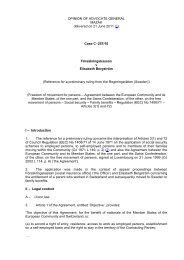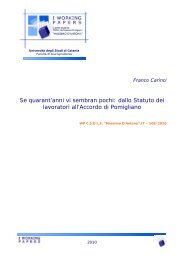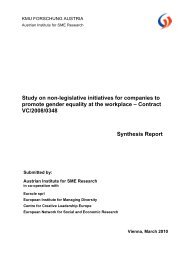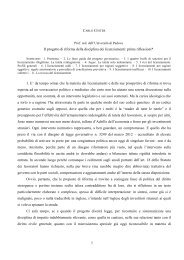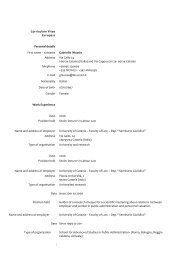Full text - European Trade Union Institute (ETUI)
Full text - European Trade Union Institute (ETUI)
Full text - European Trade Union Institute (ETUI)
You also want an ePaper? Increase the reach of your titles
YUMPU automatically turns print PDFs into web optimized ePapers that Google loves.
Isabelle Schömann and Coralie Guedes<br />
pretation of the provisions of the Directive (UK). Some other examples (albeit<br />
not an exhaustive list) show the reluctance of Member States to respect the<br />
words and spirit of the Directive: for example, in Bulgaria and in Portugal,<br />
where the way in which the Directive is being transposed, in the economic<br />
crisis and without any consultation of the social partners, is affecting the real<br />
spirit of the Directive and allows very different interpretations of the resulting<br />
<strong>text</strong>s of the several amendments of the existing law; and also in Germany,<br />
where some articles of the Directive were ignored, others partly transposed.<br />
Moreover, vague legal terms remained undefined, which has caused a lack of<br />
legal certainty, for example on the issue of access to vocational training while<br />
on the job. In the United Kingdom, where the regulations apply in a minimalist<br />
fashion, providing as little protection as is possible under the Directive.<br />
The TUC together with Unite explore the possibility of legal action to challenge<br />
the regulations through the <strong>European</strong> Courts. Regarding equal treatment<br />
a proactive stand would be necessary as often the temporary worker<br />
simply does not have the necessary information to benefit from all the facilities<br />
and benefits available to the permanent staff. UNI-Europa has expressed<br />
concerns about possible abuses, ‘noting that Article 5.1 of the Directive allows<br />
for a qualifying period before the principle of equal treatment is applicable, on<br />
the basis of a national social partners’ agreement; it also permits derogations<br />
and flexibilities for agency workers on permanent contracts of employment<br />
who are paid between assignments’. UNI-Europa stated ‘that there is some<br />
evidence of temporary agencies employing workers on permanent contracts,<br />
thus making them permanent employees of the agency and exempt from the<br />
equal treatment requirements of the Directive’ (Eurofound 2012). 11<br />
Temporary agency work has been the most rapidly growing form of atypical<br />
work in the EU over the past 20 years (Arrowsmith 2008). If, on one side (the<br />
supply side), temporary agency work may smooth the re-engagement of the<br />
(long-term) unemployed into work, increase the participation of people that<br />
need or prefer temporary work in the labour force by both maintaining their<br />
employability and propose a form of work–life balance, it allows, on the other<br />
side (the demand side), ‘user firms to make relatively easy labour adjustments<br />
and offers transaction-cost savings by outsourcing some responsibility for<br />
recruitment and administration’ (Arrowsmith 2008). In addition, the massive<br />
and systematic use of temporary agency work allows for reductions in<br />
the ‘core’ permanent workforce, but also to respond to any production peaks,<br />
so as to get wage costs under control and achieve labour flexibility. It is most<br />
used to get lower-skill workers in competitive sectors with varying or unpredictable<br />
demand. As a consequence, temporary agency work is at the centre of<br />
the ‘flexicurity’ debate, increasing trade union concerns about the treatment<br />
of agency workers, as well as having potential implications for permanent<br />
workers. Indeed, temporary agency work may lead workers to work for less<br />
money and with less protection, under much worsen working conditions than<br />
other workers in terms of equality of treatment in pay or access to workers’<br />
11. See: http://www.eurofound.europa.eu/areas/industrialrelations/dictionary/definitions/temporaryagencywork.htm<br />
64 WP 2012.13





